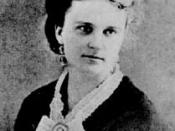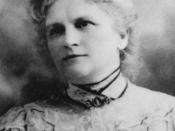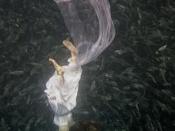Kate Chopin's short story "The story of an hour,"ÃÂ is a story of an hour in the life of Mrs. Mallard, a young "repressed"ÃÂ woman who begins to look at her widowhood as a rebirth. Chopin tells us in the beginning of the story that Mrs. Mallard suffers from "heart trouble,"ÃÂ yet she is described as "young, with a fair, calm face, whose lines bespoke repression and even a certain strength"ÃÂ (27), which depicts her as being old for her age. Chopin presents this woman who instead of being upset and heart broken over her husband's death, experiencing complete joy. The Story of an hour deals realistically with the possibilities of life, individual consciousness, and freedom.
Mrs. Mallard's reacts to the news "with sudden, wild abandonment"ÃÂ and goes upstairs to her room and looks out an open window and notices "new spring life, "delicious breath of rain"ÃÂ, and "countless sparrows twittering in the eaves."ÃÂ
The open window symbolizes her freedom.
When you look closely at the information given when Louise looks out of the window, you see that the language there foreshadows the ironic happiness that she feels at being set free. Instead of the weather being gloomy and dark, the sky shows "patches of blue."ÃÂ As critic Joseph Rosenblum states, "As she contemplates her future, she imagines "spring days and summer days"ÃÂ only, not autumn or winter days, because she links herself to the seasons of rebirth and ripening (2242-2243)."ÃÂ When the freedom Louise Mallard sees out the open window finally reaches her, she does not know how to react: "There was finally something coming to her and she was waiting for it, fearfully. What was it? She did not know, it was too subtle and elusive to name. But she felt it, creeping out of the sky,reaching towards her through the sounds, the scents, the colors that filled the air"ÃÂ(27). Mrs. Mallard experiences momentary grief only until she comes to realize that now, without her husband, she can "live for herself" because she is "Free! Body and soul free!" She begins to view the world with a fresh outlook. Louise is not grieving over her dead husband or having negative thoughts about her future. She feels something that she has forgotten she could feel. Her happiness is not with her husband, it's with her rank in the male dominated society because she is a married woman.
When Mrs. Mallard learns of her husband's death, she comes "Louise"ÃÂ, a woman aware of her desires. It was not until her husband's supposed death that we find out her name is Louise. In the remaining of the story, she was referred to as either "Mrs. Mallard"ÃÂ or "wife"ÃÂ. Chopin demonstrates that even within the confines of a loving marriage, the woman as a "wife"ÃÂ lacks identity and voice. When Louise marries Bentley, she loses her own identity and assumes a new and strange one. Critic Jennifer Hicks points out that, "While freedom is an innate desire for all creatures, patriarchal society conditions women to suppress and to repress their desires for freedom, so much so that the possibility of freedom, when available, is frightening"ÃÂ (2). Ultimately she decides to view her husband's death as an opportunity to become a part of this life in ways that she never had before. This woman is very in tune with this loss and even though her love for her husband keeps her from it, the freedom she feels when she thinks he is dead becomes unavoidable and enjoyable.
After accepting her new found identity, Louise exits from her room to join her sister and her husband's friend. She opens the door and walks out "like goddess of victory"ÃÂ with a sparkle in her eye and a new sense to herself. She descends the staircase to freedom together As she joins her sister to return downstairs where Richard still waits. Mrs. Mallard stood amazed when she saw Bentley, unharmed and completely composed, unaware of the transformation that has occurred with his absence. Mrs. Mallard's heart stopped at the sight of seeing him alive. Josephine's and Richard's reactions reflect that their expectation that Louise Mallard, with her weak heart, would experience an overwhelming joy at the sight of her husband. The doctors who treat Louise add the final irony by declaring that she died of "a joy that kills,"ÃÂ rather than recognizing that it was the actual joy she felt when she realized that her husband was dead and the pain so great that killed her when she saw him walk through the door.
The Story of an Hour questions the assumption that news of a husband's death should be devastating to the woman. The story exams Mrs. Mallard's reaction to her sudden and unexpected independence and ends surprisingly when she discovers that her husband is still alive. Her death was really an ultimate freedom from her unhappy marriage.





